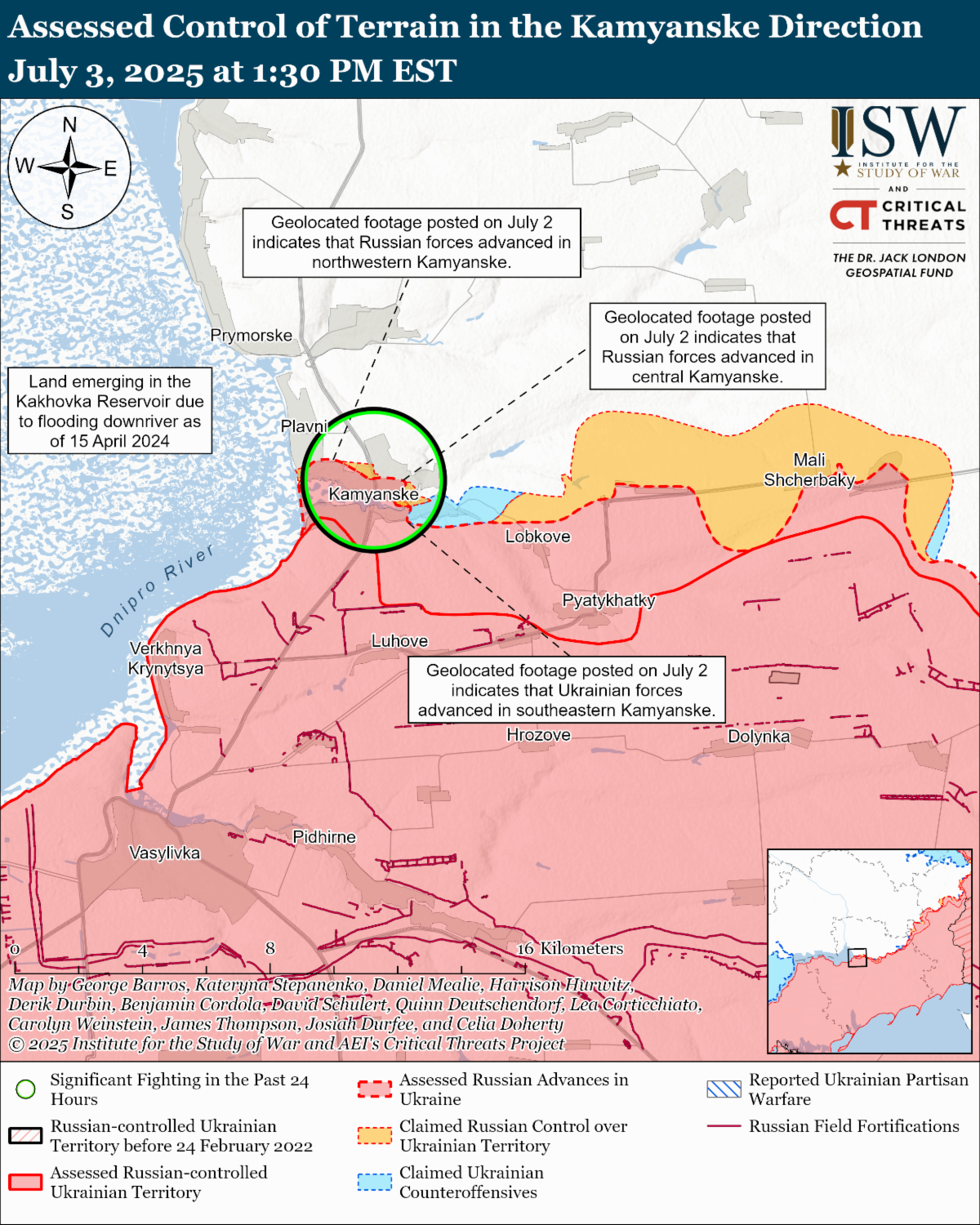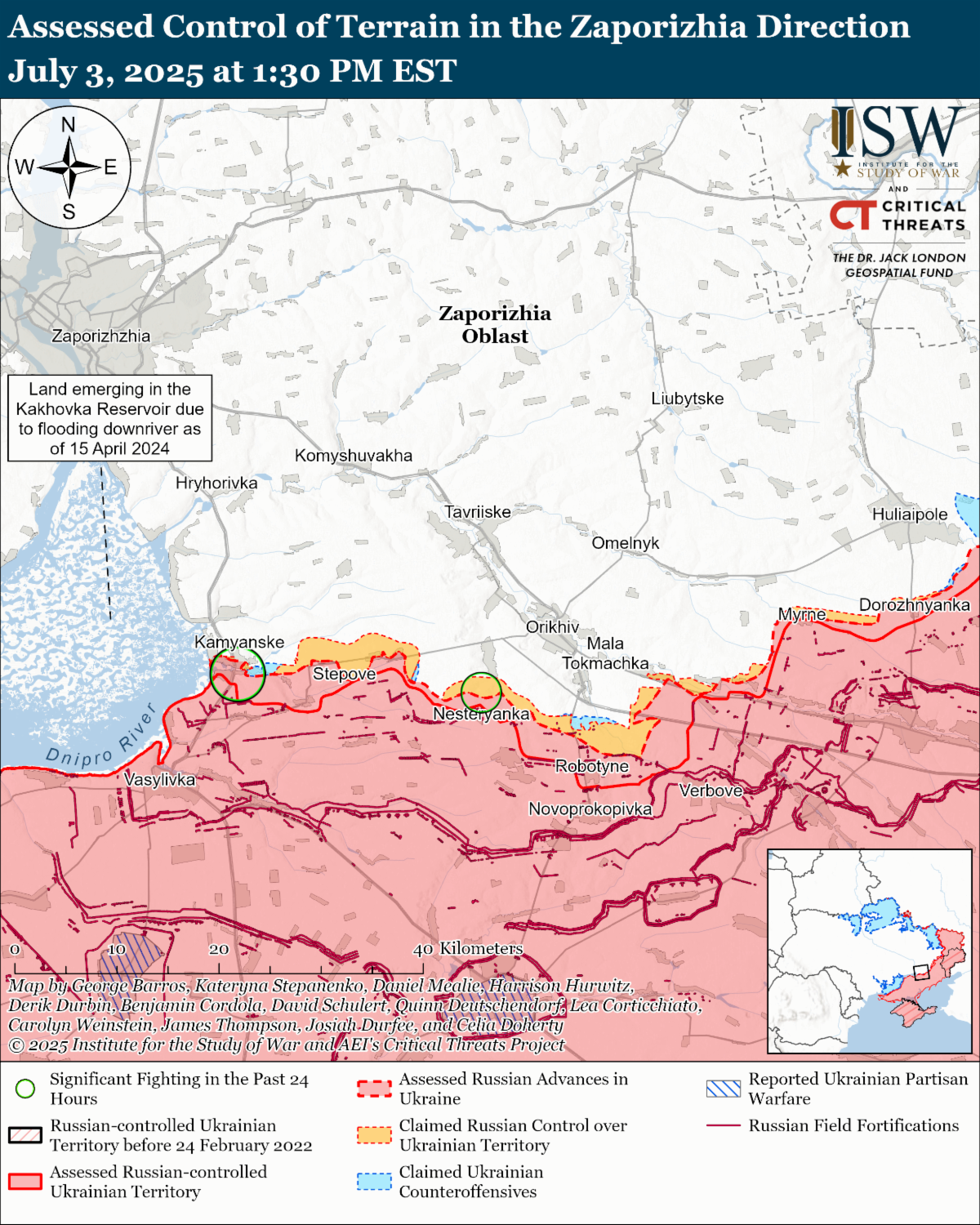Russian President Vladimir Putin rejected US President Donald Trump's call for a quick peace in Ukraine during a phone call with Trump on July 3. Russian Presidential Aide Yuriy Ushakov claimed on July 3 that Trump once again raised the issue of a quick end to Russia's war in Ukraine and that Putin claimed that Russia continues its efforts for a negotiated end to the war. Ushakov claimed, however, that Putin reiterated that Russia "will achieve its goals" and "eliminat[e] the root causes" that led to the war and that "Russia will not back down from these goals," essentially emphasizing that Russia will continue its war on its own terms. Ushakov claimed that Putin and Trump discussed the possibility of a third round of Ukrainian–Russian negotiations in Istanbul and agreed that peace negotiations will continue in a bilateral format at an unspecified date. Ushakov claimed that Putin and Trump did not discuss the recent US decision to halt military aid shipments to Ukraine but discussed bilateral economic projects, including in the energy and space spheres.
Putin's stated commitment to his goals in Ukraine, including eliminating the so-called "root causes" of the war directly contradicts his claim that Russia supports meaningful negotiations to end the war. Putin and other Kremlin officials have repeatedly referred to the need for any future peace settlement to eliminate the alleged "root causes" of the war to allude to Russia's unwavering demands for regime change in Ukraine, Ukrainian neutrality, and changes to NATO's foundational open-door policy. ISW continues to assess that Russia remains uninterested in good-faith peace negotiations to end the war. Putin's statement that Russia will not back down from its goals further demonstrates Putin's willingness to prolong the war in Ukraine and achieve his goals through military means should Russia be unable to force Ukraine to capitulate through diplomatic means — in direct contrast to Trump's calls for a speedy end to the war. The Kremlin has continually indicated in recent weeks that there are no plans yet for a third round of bilateral negotiations in Istanbul, so it is unclear if or when bilateral Ukrainian–Russian negotiations will resume. ISW continues to assess that Russia will likely leverage any future negotiations to try to extract concessions from Ukraine and the United States while Russian forces continue efforts to secure additional gains on the battlefield through creeping and highly attritional advances. Russia previously exploited peace talks with Ukraine in Istanbul to obfuscate its own uninterest in meaningful negotiations, and any future Ukrainian–Russian negotiations on anyone's terms but Kyiv's are very unlikely to bring about Trump's desired expeditious end to the war and just and lasting peace.
Key Takeaways:
- Russian President Vladimir Putin rejected US President Donald Trump's call for a quick peace in Ukraine during a phone call with Trump on July 3.
- Putin's stated commitment to his goals in Ukraine, including eliminating the so-called "root causes" of the war directly contradicts his claim that Russia supports meaningful negotiations to end the war.
- Details about the recent US suspension of aid to Ukraine remain unclear.
- A Ukrainian strike killed the deputy commander-in-chief of the Russian Navy in Kursk Oblast, and an unknown actor may have assassinated a high-ranking Russian Federal Security Service (FSB) official in Moscow City.
- Ukraine's Security Service (SBU) reportedly assassinated the former occupation mayor of Luhansk City.
- Ukraine’s Western allies continue to provide military aid to Ukraine, but the United States remains the only Ukrainian partner that can provide certain critical weapons systems – especially air defenses -- at scale and quickly.
- Ukrainian forces recently advanced near Borova and Siversk and in western Zaporizhia Oblast. Russian forces recently advanced near Kupyansk, Toretsk, and Velyka Novosilka and in western Zaporizhia Oblast.
| 





 [ISW] 이란 업데이트, 2025년 7월 3일
[ISW] 이란 업데이트, 2025년 7월 3일
 [ISW] 러시아 점령 업데이트, 2025년 7월 3일
[ISW] 러시아 점령 업데이트, 2025년 7월 3일